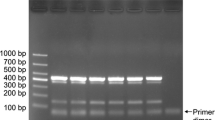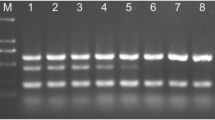Abstract
Phoma foveata, Phoma exigua var. exigua, and Phoma eupyrena are fungal pathogens of potato, causing gangrene or pit rot symptoms in tubers, and they are responsible for significant crop losses. Various techniques are available to identify these pathogens in the laboratory. A multiplex Plexor® real-time PCR method which can detect and identify these pathogens in a single reaction will be presented.
Access this chapter
Tax calculation will be finalised at checkout
Purchases are for personal use only
Similar content being viewed by others
References
Boerema GH (1967) The Phoma organisms causing gangrene of potatoes. Neth J Plant Pathol 73:190–192
EPPO (1997) Phoma exigua var. foveata data sheets on quarantine pests. Prepared by CABI and EPPO for the European Union. Quarantine pests for Europe, University Press, Cambridge, pp 865–871
Yang C-D, Chen X-R, Jiang H-X et al (2012) First report of potato gangrene caused by Phoma foveata in China. Plant Dis 96(11):1698
Stevenson WR, Loria R, Franc GD et al (2004) Compendium of potato diseases, 2nd edn. APS Press, St. Paul, MN
MacDonald JE, White GP, Cote M-J (2000) Differentiation of Phoma exigua var. foveata from P. exigua using a RAPD generated PCR-RFLP marker. Eur J Plant Pathol 106:67–75
Cullen DW, Toth IK, Boonham N et al (2007) Development and validation of conventional and quantitative polymerase chain reaction assays for the detection of storage rot potato pathogens, Phytophthora erythroseptica, Pythium ultimum and Phoma exigua var. foveata. J Phytopathol 155:309–315
Aveskamp MM, Woudenberg JHC, De Gruyter J et al (2009) Development of taxon-specific sequence characterized amplified region (SCAR) markers based on actin sequences and DNA amplification fingerprinting (DAF): a case study in Phoma exigua species complex. Mol Plant Pathol 10:403–414
Frackman S, Ekenberg S, Hoffman K et al (2005) Plexor® technology: a new chemistry for real-time PCR. Promega Notes 90:2–4
Author information
Authors and Affiliations
Corresponding author
Editor information
Editors and Affiliations
Rights and permissions
Copyright information
© 2015 Springer Science+Business Media New York
About this protocol
Cite this protocol
A’Hara, D. (2015). Detection and Identification of Phoma Pathogens of Potato. In: Lacomme, C. (eds) Plant Pathology. Methods in Molecular Biology, vol 1302. Humana Press, New York, NY. https://doi.org/10.1007/978-1-4939-2620-6_2
Download citation
DOI: https://doi.org/10.1007/978-1-4939-2620-6_2
Publisher Name: Humana Press, New York, NY
Print ISBN: 978-1-4939-2619-0
Online ISBN: 978-1-4939-2620-6
eBook Packages: Springer Protocols




